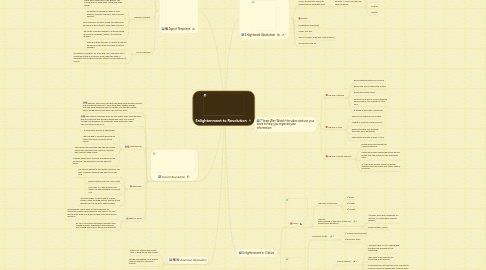
1. Age of Napoleon
1.1. Napoleon Himself
1.2. Domestic Policies
1.2.1. One of the first things he did was make peace with the Catholic Church.
1.2.2. He codified the laws. During the revolution this was started but it was never finished until Napoleon came around.
1.2.3. He created a strong centralized administration.
1.3. Napoleon's Empire
1.3.1. He first took a pause form war and had peace. There were three parts to his Empire: The French Empire, dependent states, and allied states.
1.3.2. He wanted to spread his ideas of legal equality, religious toleration, and economic freedom.
1.3.3. Since Napoleon couldn't defeat the British over the sea he instead tried to lower their economy.
1.3.4. The sense of unique identity of a people based on common language, religion, and national systems.
1.4. Fall of Napoleon
1.4.1. Napoleon knew the risks of raiding Russia but he had to punish them some way for being resistant.
1.4.2. At Waterloo in Belgium on June 18th 1815, Napoleon met a combined British and Prussian army under the Duke of Wellington and suffered a bloody defeat. He was exiled to St. Helena.
2. French Revolution
2.1. Basically, the French felt that they were being treated unjustly and revolted because of it. There were three estates and the first two were important such as clergies, and the third estate wasn't to the French, they were just everyone else.
2.2. The National Assembly basically was where every representative had one vote that way the Third Estate had more of a chance but the King disagreed so instead the Third Estate held their own in a tennis court room.
2.3. Initial Resolve
2.3.1. It gave basic liberties to the people.
2.3.2. The King had to concede because he feared that other countries would reform.
2.3.3. The Church was reformed after the land of the church was sold while the National Assembly was trying to make money.
2.3.4. Clergies, government officials, and judges would be elected. The king would lose his absolute power.
2.4. Radicalism
2.4.1. The French wanted to abolish the monarchy and start a republic because they didn't trust the King.
2.4.2. George Danton and Jean-Paul Marat.
2.4.3. King Louis XVI was sentenced to death. He was beheaded on January 21st.
2.4.4. Uprisings began to spring about. Austria, Prussia, Spain, Portugal, Britain, and the Dutch Republic all took up arms against France.
2.5. Reign of Terror
2.5.1. Revolutionary courts were set up temporarily to prosecute counter-revolutionaries and traitors. 40,000 people were killed and 16,000 of them were killed by the guillotine.
2.5.2. By 1794, the French had largely defeated their foreign enemies. Robespierre was obsessed with ridding France of all the corrupt elements.
3. American Revolution
3.1. Britain not treating the people right. A huge factor was religion.
3.2. George Washington, John Adams, Thomas Jefferson, Benjamin Franklin.
3.3. America's Freedom
4. Enlightened Absolutism
4.1. A form of absolute monarchy inspired by the Enlightenment.
4.1.1. Despots: A cruel ruler who has absolute power
4.1.1.1. Prussia
4.1.1.2. Russia
4.1.1.3. Austria
4.1.1.4. France
4.2. Affects
4.3. Enlightened Absolutism
4.4. Seven Year War
4.5. Wars in Europe, India, and North America
4.6. Architecture and art
5. 7 Years War: Watch the video and use your book to help you organize your information
5.1. The War in Europe
5.1.1. Rivalry between Britain and France
5.1.2. Russia and France sided with Austria
5.1.3. Britain allied with Prussia
5.1.4. Fredrick the Great of Prussia defeated Russia, France, and Austria for some time
5.1.5. It ended in 1763 with a stalemate
5.2. The War in India
5.2.1. Know as the Great War for Empire
5.2.2. Fought in India and North America
5.2.3. British ultimately won because they were more persistent
5.2.4. Ended with he Treaty of Paris in 1763
5.3. The War in North American
5.3.1. British Americans fought the French Americans
5.3.2. Native Americans viewed the French as less hostile than the British, so they sided with them.
5.3.3. In 1759 under General Wolfe the British defeated the French who was under General Montcalm
6. Enlightenment in Culture
6.1. Music
6.1.1. Important Composers
6.1.1.1. 1) Bach
6.1.1.2. 2) Haydn
6.1.1.3. 3) Mozart
6.1.2. Impacts: After listening to the music in the link, answer these questions.
6.1.2.1. It sounds really good especially for his time. It sounds really amazing actually.
6.1.2.2. Kinda soothed I guess.
6.2. Art
6.2.1. Important Artists:
6.2.1.1. 1) Caspar David Freidrich
6.2.1.2. 2)Francisco Goya
6.2.2. Important Works:
6.2.2.1. Raft of Medusa
6.2.2.1.1. I see that there is a lot of death, and that they are reaching out for something.
6.2.2.1.2. They seem to be reaching for something, hope maybe?
6.2.2.1.3. It describes the raft that they're on. The Raft of Medusa. Medusa in Greece was a woman who had snakes for hair.
6.2.2.1.4. The rulers.
6.2.2.2. Liberty Leading the People
6.2.2.2.1. I see that is again death. One side seems to be victorious.
6.2.2.2.2. Liberty, Lady Liberty, the Statue of Liberty, she is leading the people. That's who the women is representing.
6.2.2.2.3. What does the title describe?
6.2.2.2.4. The people.
